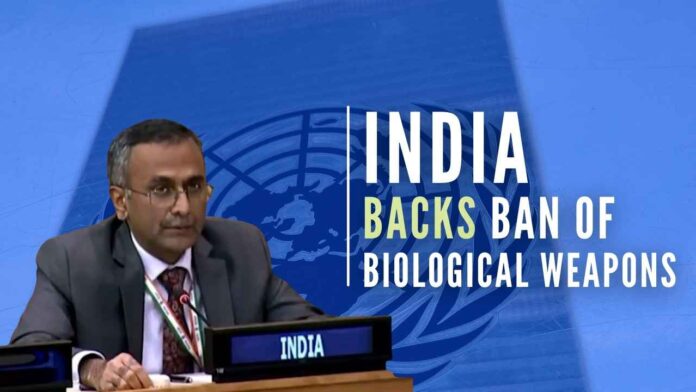
Important to ensure biological weapons’ implementation in letter and spirit: India at the UNSC
At the United Nations Security Council (UNSC) India strongly advocated the Biological and Toxin Weapons Convention (BTWC) saying that it is important to ensure its implementation in letter and spirit.
India said on Friday that it is important that the BTWC is implemented effectively, but did not take a direct stand on Russia’s allegations that biological warfare research was carried out in Ukraine.
The UN Security Council meeting was convened at the request of Russia. It was a repeat of a session called last Friday by Russia to air its allegations that biowarfare research was carried out in Ukraine labs in conjunction with the US.
India’s Deputy Permanent Representative to the UN, R Ravindra, “It is important to ensure full and effective implementation of the BTWC in letter and spirit. India attaches high importance to the Biological and Toxin Weapons Convention as a key global and non-discriminatory disarmament convention, prohibiting an entire category of weapons of mass destruction.”
Russia’s Permanent Representative Vasily Nebenzia reiterated the allegations citing what he said were documents seized during the invasion of Ukraine.
High Representative for Disarmament Affairs Izumi Nakamitsu said the UN “is not aware of any such biological weapons programme”. She said that 2,032 civilian casualties have been reported in Ukraine till Wednesday, including 58 children.
Nakamitsu said that most of the casualties were caused by “explosive weapons with wide-area impact”, including cruise and ballistic missiles, and airstrikes, which are prohibited by international humanitarian law for use against civilians.
US Permanent Representative Linda Thomas-Greenfield dismissed the Russian allegations as “Malarkey”, a word she said President Joe Biden uses for untrue allegations.
She countered that “Russia has long maintained a biological weapons program in violation of international law. It is Russia that has a well-documented history of using chemical weapons”.
Albania’s Permanent Representative Ferit Hoxa alleged that Russia was setting the stage for its own use of chemical or biological weapons by making the claims of a US-backed biowarfare programme in Ukraine.
He added that to investigate its claims, Russia should agree to a ceasefire and set up a 40 km zone free of fighting around the labs Russia claims were used for biowarfare research to enable the UN to investigate.
However, China’s Permanent Representative Zhang Jun said that the “party concerned” should “respond to questions and offer timely and comprehensive clarifications” to “newly discovered the relevant documents” cited by Russia.
Nebenzia said that the documents Russia had found “direct funding and supervision of the Pentagon, Defence Threat Reduction Agency” to labs in Ukraine for what he claimed were “military and biological projects.”
Thomas-Greenfield said, “We aren’t going to dignify Russia’s disinformation or conspiracy theories. But we will continue to sound the alarm and tell the world where we think Russia is heading. And we will remind the world that Russia has repeatedly, repeatedly, lied to this Council over recent weeks.”
But she also stated categorically, “There are no Ukrainian biological weapons laboratories – not near Russia’s border, not anywhere.”
She added, “There are only public health facilities, proudly — and I say proudly — supported and recognized by the US government, the World Health Organization, and other governments and international institutions.”
Ravindra endorsed Nakamitsu’s statement that any concerns about biological weapons should be resolved under the BTWC.
“We also believe that any matter relating to obligations under the BTWC should be addressed as per the provisions of the Convention and through consultations and cooperation between the parties concerned,” Ravindra said.
Article 5 of the 1972 BTWC Convention says, “Parties to this Convention undertake to consult one another and to cooperate in solving any problem which may arise in relation to the objective of the objective of or in the application of the provisions of this convention.”
Ravindra said that “India remains deeply concerned at the progressively deteriorating situation in Ukraine” and that it welcomed “the latest round of diplomatic talks between the Russian Federation and Ukraine”.
“We need to undertake this engagement keeping in mind the need to respect the principles of the UN Charter, international law and sovereignty and territorial integrity of states”, he said while calling for an immediate end to hostilities.
[With Inputs from IANS]
PGurus is now on Telegram. Click here to join our channel and stay updated with all the latest news and views
For all the latest updates, download PGurus App.
- PM Modi extends wishes on Hanuman Janmotsav; shares video highlighting importance of Shri Hanuman - April 23, 2024
- EU announces multiple-entry Schengen visas for Indian nationals with longer validity - April 22, 2024
- Iranian President gives no support to Pakistan PM over Kashmir issue - April 22, 2024










